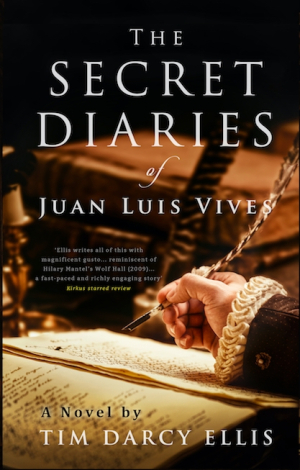The Secret Diaries of Juan Luis Vives
With its clear portrayal of inner conflict, The Secret Diaries of Juan Luis Vives is a provocative, multicolored historical novel that examines hidden faith.
Tim Darcy Ellis’s intricate biographical novel, The Secret Diaries of Juan Luis Vives, approaches the Spanish scholar and Renaissance humanist through absorbing journal entries set in sixteenth-century Europe.
In Flanders in 1522, Vives is gifted a diary and begins to record effusive commentary about his exile from Valencia. Direct addresses to the diary, rhetorical questions, everyday observations, and brutal memories of the Spanish Inquisition reveal Vives as a man with a capacious intellect who fears exposure and misses the family he left behind. His voice is, by turns, fluent, confessional, and hesitant, suiting the fact that he is determined to survive as an ambitious converso among foreigners, concealing his Jewish identity.
Vives’s doubts about his contemporaries mix with his hope that he can start a romance with Marguerite, the daughter of Jewish exiles. When his association with her leads authorities to confine him under the suspicion of “Judaising,” colorful Sir Thomas More, who wants Vives to tutor Princess Mary Tudor in England, helps him to leave Flanders. Throughout the novel, Vives is accompanied by Álvaro de Castro, a streetwise poet, confidante, and fellow Spanish converso whose devoutness is a fascinating counterpoint to Vives’s divided loyalties.
The book’s enhanced biographical details focus on Vives’s self-consciousness. His family tragedies are at first tempered by his wit, which fades as the story progresses, hinting at rising pressures on his character. His self-protective instincts, which he regards as cowardice, are threaded with bravado, while his secrecy and sometimes ingratiating manners are framed within the era’s horrifying persecutions. These add up to a layered personality whose determination to “choose life” pierces through his fears.
Vives’s attempts to fit in among luminaries continues in England. His passionate lectures regarding his ideals of a more equal, multi-faith society and education for the poor—despite the controversy of such topics and risk of exposing his Jewishness through them—fuel him. His beguilement over More’s daughter sets the stage for later events. It’s unsurprising when others discover the truth about Vives; how the discovery unfolds involves a climactic chain of mistakes with harsh consequences.
Other historical figures, about whom details are shared in a helpful cast list, are showcased through lively conversations that retain the period’s essence but are free of archaisms. Later sections rush through the details of Vives’s personal life, including his marriage to Marguerite and his family complications. The turmoil between the English king and queen, both of whom Vives tries to appease, inspires a tense sequence that underscores the consequences of Vives’s duplicity. This culminates with Vives’s humbling yet liberating realization that it’s not up to him to orchestrate freedom for Jewish people, as such work is ongoing.
In its clear portrayal of inner conflict, the novel humanizes Vives and concludes with a satisfying, circular return to Belgium. The Secret Diaries of Juan Luis Vives is a provocative, multicolored historical novel that examines hidden faith.
Reviewed by
Karen Rigby
Disclosure: This article is not an endorsement, but a review. The publisher of this book provided free copies of the book and paid a small fee to have their book reviewed by a professional reviewer. Foreword Reviews and Clarion Reviews make no guarantee that the publisher will receive a positive review. Foreword Magazine, Inc. is disclosing this in accordance with the Federal Trade Commission’s 16 CFR, Part 255.

